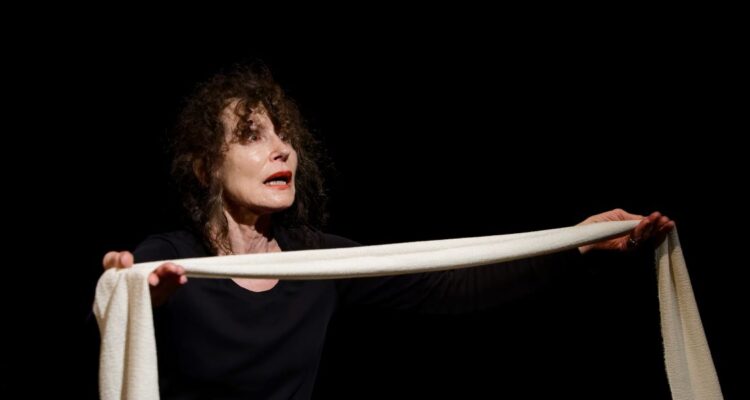One of my abiding memories of visiting Russia at the turn of the century is the small bands of musicians who would appear in uniform in all sorts of locations to play tunes not just for tourists, but for for every kind of occasion. The sheer number of trained musicians impressed, though it was saddening to see how few opportunities there were for them to make a living. I was reminded of this experience during Inna Goncharova’s new play at the Finborough, which focuses on one such hapless musician, a trumpeter caught up in the desperate circumstances of the siege of of Mariupol in 2022.
The play adopts the viewpoint of this trumpeter and wannabe composer who finds himself in an underground bunker in the Azovstal steelworks alongside a regular soldier, Kolya, a nurse, and a wounded lawyer. Under the sounds of constant bombardment, the trumpeter imagines creating a ‘symphony of war’ out of the cacophony of gunfire, and reminisces about his pre-war life, his band colleagues, all now killed, and the accidents of war that have brought him to this desperate pass, including separation from his partner who has fled to the West. Kolya puts up with this narrative and its musical illustrations in long-suffering fashion, until the worsening situation gradually reduces their number.
This whole landscape of memory and suffering is remarkably evoked by just one single performer – Kristin Milward. She has won plaudits before in recreating the sufferings of war in Ukraine, and this is a substantial reprise. She has few visual aids to work with – just four chairs to represent the four characters of the play, and a few props for each of them. There is a horn to substitute for a trumpet, a music stand, and a bandage. Apart from that we rely on her own creativity and dynamism to get the message across, whether in depicting the sounds of war or in summoning up the bonds of friendship and intimacy that develop between people placed in conditions of extreme stress. It is a role played with a biting intensity and layers of tenderness, also revealing along the way many of the intuitively powerful characteristics of the style of the play’s director, Vladimir Shcherban.
It is a short play, with inevitable compression, but it could perhaps be improved by opening out the time sequence a little to give a stronger and richer sense of life before adn during the stages of the siege. We certainly feel the yearning for peace and for the restoration of harmony but within the length of the play we simply feel the ever-deepening grimness of the situation. A little less relentlessness, and a bit more light and shade, would actually make the play more moving and powerful, rather than less.
But overall this is a fine example of the principle that ‘less is more’, with the creative team using the small-scale of the Finborough to very good effect. Moreover, each evening there is a post-show event focusing not just on the war in Ukraine but on the poetry, music and drama of war and bringing together a wide circle of creative international talent. Both for itself, therefore, and for the importance of the themes that radiate outwards through these evenings, the play deserves more than one viewing.
Writer: Inna Goncharova
Performer: Kristin Milward
Director: Vladimir Shcherban
Photo Credit: Davor Tavorlaza
60 mins, no interval
Until 3rd August, 2024

